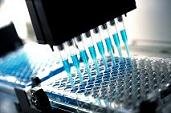Advertisment
Metal test could help diagnose breast cancer early

It may be possible to develop a simple blood test that, by detecting changes in the zinc in our bodies, could help to diagnose breast cancer early.
A team, led by Oxford University scientists, took techniques normally used to analyse trace metal isotopes for studying climate change and planetary formation and applied them to how the human body processes metals.
In a world-first the researchers were able to show that changes in the isotopic composition of zinc, which can be detected in a person’s breast tissue, could make it possible to identify a ‘biomarker’ (a measurable indicator) of early breast cancer.
A report of the research by the Oxford University-led team, which included researchers from Imperial College London and the Natural History Museum, London, is published in the Royal Society of Chemistry journal Metallomics.
The pilot study analysed zinc in the blood and blood serum of ten subjects (five breast cancer patients and five healthy controls) alongside a range of breast tissue samples from breast cancer patients. By using techniques that are over 100 times more sensitive to changes in the isotopic composition of metals than anything currently used by clinicians, the researchers were able to show that they could detect key differences in zinc caused when cancer subtly alters the way that cells process the metal. Similar changes in copper in one of the breast cancer patients is additional evidence that it may be possible to identify a biomarker for early breast cancer that could form the basis of a simple, non-invasive, diagnostic blood test.
‘It has been known for over a decade that breast cancer tissues contain high concentrations of zinc but the exact molecular mechanisms that might cause this have remained a mystery,’ said Dr Fiona Larner of Oxford University’s Department of Earth Sciences, who led the research. ‘Our work shows that techniques commonly used in earth sciences can help us to understand not only how zinc is used by tumour cells but also how breast cancer can lead to changes in zinc in an individual’s blood – holding out the promise of an easily-detectable biomarker of early breast cancer.’
The researchers say that this new understanding of cancer cell behaviour – in particular the role sulfur-containing proteins play in how tumours process zinc – could also help in the development of new cancer treatments.
‘The hope is that this research is the beginning of a whole new approach,’ said Dr Larner. ‘Understanding how different cancers alter different trace metals within the body could enable us to develop both new diagnostic tools and new treatments that could lead to a ‘two-pronged’ attack on many cancers. Further research is already underway to see what changes in other metals may be caused by other cancers.’
Contact: University of Oxford News Office
news.office@admin.ox.ac.uk





